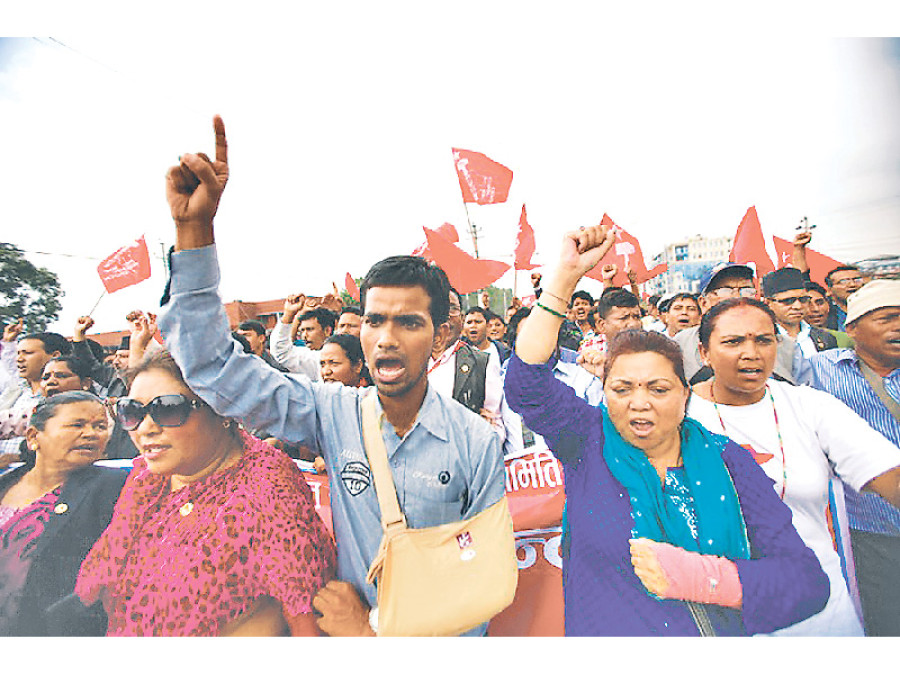Opinion
Roots of rage
Despite being privileged Bahuns, we have done nothing to end discrimination against Dalits
Bhawana Upadhyay
The news about Dalits protesting for a Dalit-friendly constitution, and the incident in Siraha where Dipak Mallik was not allowed to draw water from a communal well—both of which went viral on social media—reminded me of my Bahun identity.
On being a Bahun
As I was born and brought up in an orthodox Hindu family, I can easily recount various forms of caste and gender-based prejudices being practiced both publicly and privately by many of us Bahuns. One example comes from early on, when my excitement used to know no bounds on seeing Mr Bishwokarma, our farm caretaker, in our house every other week with a basket of goodies. Mr Bishwokarma would come to discuss issues related to paddy harvests, sales, the storage of seeds, barter and cash distribution to tillers, and so on. But I used to be completely put off by my mom’s terrible reminders, “He is Kami, we are not supposed to touch him while eating. Beware, before your dad gets outraged!” However, I wanted Mr Bishwokarma to be treated like one of us. It was not because I knew about the tyranny of the caste system. It was because the goody basket that he would bring consisted of one of my favourite things—eggs. He used to be the only one who would bring eggs to our house, as buying, storing, or cooking eggs in our kitchen were not allowed then. I used to wonder why there was such abhorrence towards someone who walked miles to reach us with his basket of goodies.
I never had the courage to speak out against my dad’s beliefs and practices. But the sheer observation of such practices taught me many things about social injustice from an early age. That is possibly the reason why I often question my identity as a Bahun.
Twenty years later, I found myself directly working with Mr Bishwokarma. He was designated as one of my key informants for my Master’s degree research work in Sunsari. I got the opportunity to know him more during that time. He helped me in finding local enumerators, shared his knowledge, and gave historical anecdotes about the Tarai farming system and crop management practices.
During my stay in Sunsari for about two weeks, I had the opportunity to have lunch with him, and I was happy to be in his kitchen. He actually took pride in sharing this news in the community, whereas my own family members did not appreciate my deeds.
I found Mr Bishwokarma to be a very liberal and compassionate man. There was not much difference between me and him. The only visible differences were the way he dressed up, his dialect, gestures, level of education, and of course, his possessions. For me, these differences are the construction of social injustice. Is it Mr Bishwokarma’s fault to have been born into a Dalit family?
Ignoring responsibilities
Somewhere deep inside, I feel that despite being privileged Bahuns, we have done nothing to change these discriminatory practices. We have always perceived it as the state’s sole responsibility. We always choose to maintain our identity as mere observers. I wonder whether we could have diluted such practices to a certain extent had my parents let Mr Bishwo-karma enter our kitchen in the early 1970s. We might have even been among the first few changemakers to advocate for the fundamental rights of Dalits.
The sad thing is that even today, us Bahuns hold the same position. Time has changed but we have not. Though Dalits constitute 13 percent of the total population according to Nepal’s census, their human development rankings have been the lowest for a very long time. A World Bank report states that nearly 50 percent of them live below the poverty line, compared to the national average of 31 percent. Many Dalits in the lowlands of Nepal are landless and live on less than $1 a day.
Crime against humanity
It is high time we understood that protests like the Dalit march of August 4 on the streets of Kathmandu can no longer be ignored. Their demand for at least three percent representation at the central level, five percent at the provincial level and 10 percent at the local level is completely justifiable. Not endorsing the Dalits’ demands clearly portrays our lawmakers’ deep-rooted caste-based identity mindset.
It seems as though caste identity is a sticky belonging that most of us still find difficult to discard in our present social setting. It certainly is more than just an old-fashioned mindset. It has become a vehicle to gain political power and prominence. And possibly for this reason, caste-based prejudices are unlikely to disappear from Nepal’s landscape for a long time.
Nepal is a nation of multiple identities, and one of the key identities is caste. Let us not try to use any of our identities as an instrument of political mobilisation to gain power. Above all, any form of caste-based discriminatory practice is a crime against humanity.
Upadhyay is a development practitioner




 18.12°C Kathmandu
18.12°C Kathmandu










